The Sales Leader's Guide to Performance Management

The Sales Leader's Guide to Performance Management
As a sales leader, your ability to develop and retain your sales reps is important to your company’s bottom line and future success. Employee retention in the sales field continues to be an issue. In 2018, the average sales professional tenure was reported to be 1.5 years, down by half from 2010.
Furthermore, the average sales professional turnover rate is 35% — a dramatic number compared to the average turnover rate of all industries, which is just 13%.
When your sales reps are building the skills they need to feel prepared and successful in their roles, they are more likely to report job satisfaction and feeling valued by their employer — factors that make them less likely to jump ship.
Looking to set your sales team up for this kind of success? You can achieve it with a structured sales performance management process.
Now that you’re clear on what sales performance management entails, let’s talk about why it is so important to implement it into your standard operating rhythm.
Why Sales Performance Management Matters
Having a sales performance management process in place is crucial for your team’s overall success. There is often a disconnect between the level of effort sales reps put into their work and the tangible outcome seen by sales management and the company at large. Let’s talk about why your organization needs to implement a sales performance management strategy.
1. Helps predict future sales trends
Sales performance management tracking can provide valuable data enabling your organization to forecast future sales trends and employee compensation rates — particularly for commission-based compensation structures. For example, if a sales rep earns a 15% commission for each deal they close, and are projected to close $100,000 in sales for the quarter, then your finance team will anticipate an allocation of $15,000 in commission payroll for that rep.
2. Allows sales reps to build their skills
High-performing sales teams are twice as likely to provide ongoing training to reps than low performing teams. Whether you have sales reps on your team who are new to the field of sales or seasoned sales people ready to learn more advanced selling techniques, employee development is a major perk of having a sales performance management process in place. A sales performance management plan adds structure and accountability to your training process.
Here are some elements that could be included in a sales rep development plan to help them build their skills:
- Required training for sales enablement tools
- Informational interviews with sales leaders within their company
- Supplemental reading from sales thought leaders
- Attendance at an upcoming seminar or conference
3. Builds a stronger sales rep pipeline
With structured performance management plans in place, your organization will have the framework to build a pipeline of sales reps with valuable skills who are effective and efficient at driving sales for your company. Having clear, visible goals and incentives builds well-rounded sales professionals.
4. Performance-based compensation
Organizations with sales performance management processes report more accurate compensation figures, saving between 3-5% in employee over and under-payment expenses. Having a set performance management plan keeps compensation structure and overall business objectives aligned, resulting in a more motivated sales team.
How to Implement an Effective Sales Performance Management Process
At this point, my guess is you’re sold on the importance of sales performance management. So, let’s talk about how to implement a sales performance management process that gets results.
1. Decide what performance metrics you want to assess
To create an effective sales performance management process for your sales team, simplify your overall business objectives and make them relevant to the individual contributors on your team. On a macro level, you should already have a clear understanding of what high-level success metrics your organization is being measured against.
Performance metrics should measure each individual’s tasks and activities in relation to how well they serve overall business objectives. Here are some performance metrics to consider for your sales reps:
- Individual Quota Attainment – The percentage of the sales target reached for each sales rep in a given month or sales period. This data can be helpful for benchmarking. If you find your entire team is having a hard time reaching their targets, the goal may be too aggressive. Conversely, if your entire team is hitting or surpassing quota without question, your goal may be too conservative.
- Conversion Rate – The percentage of leads each rep converted to paying customers. For example, if a rep has 100 active leads, and was able to convert 20 of them to paying customers during a sales period, they would have a personal conversion rate of 20%. Keeping track of this metric for each rep (along with an average for your team) can provide valuable data about the quality of your leads and if your team has the resources to properly nurture them for the sale.
- Sales Productivity Metrics – Sales productivity measures the rate at which your reps are able to reach their quota. Generally speaking, the faster reps reach their quota the higher their productivity. To measure sales productivity, look at the following metrics:
- Percentage of total hours spent prospecting
- Percentage of total hours spent on data entry
- Percentage of closed-won deals (how many closed deals resulted in a sale over a specific sales period)
2. Communicate objectives to your team and get their buy-in
Now that you’ve established what metrics you’ll use to understand your team’s performance, it’s time to communicate these goals to your team to get their buy-in. This is important for multiple reasons. First, your team can’t reach their goals if they don’t know what those goals are. Second, this gives space for your reps to provide feedback on what and how they are measured.
If you experience pushback from reps about specific goals you’ve set, give them space to voice their concerns. For example, reps may not agree with some of the benchmarks set ( feeling the goals are too aggressive or conservative), or may not agree with measuring some areas of performance at all. It is important to take the concerns of your reps into consideration and make sure your team understands how their individual goals relate to overall business objectives.
In this situation, work with your reps to adjust goals as needed, or include your team in the goal-setting process from the beginning. For each rep’s performance plan, you can also allow space for them to set their own stretch or development goal based off areas they’d like to improve upon. Some sample language you can use when getting rep buy-in include:
- “These objectives are necessary to ensure we’re reaching our goals as a team.”
- “We will be implementing this new structure this quarter, and can revise per your feedback after this trial period.”
- “This performance management process will keep our team aligned with the company at large.”
3. Coach and develop reps to build performance-improving skills
Once your team’s goals and development plans are in place, make sure your reps have the tools and resources they need to succeed. Many reps have identified skills they want to build or improve upon, such as effective prospecting or presenting in front of groups. Seize upon these interests and teach them.
You don’t have to be the person who teaches them but you can be the person who creates space for your reps to learn and develop. That could include keeping reps accountable for attending trainings, introducing them to a mentor, or connecting them with a teammate who excels in the area they’d like to develop.
4. Provide performance feedback to reps on a regular basis
For your sales performance management process to be effective, consistent performance reviews should be held. Including performance reviews in your regular operating rhythm is important to monitor and track the success of your sales team. A well-rounded performance review should include the following:
- Documented goals the employee is being assessed for – Talk to your reps about how they performed in regard to the specific metrics outlined in their performance review plan. Goals could include hitting 70% of their quota for the quarter or having a higher average deal value than they had the year before.
- Relevant feedback from previous reviews or projects – If your sales reps have implemented feedback from a previous review or have shown growth in a specific area, this information is important to include. For example, if your employee has developed their soft skills after receiving constructive feedback the year before, include that in their performance review as a win.
- Direct feedback on employee’s successes – How have your employee’s strengths benefited their performance? Provide examples to reinforce the behavior. For instance, if your employee has strong project management skills, document how these skills have benefited their ability to close new business or supported the sales team with implementing a project.
- Constructive feedback for the employee’s opportunities for growth – What opportunities does your employee have for improvement? Provide examples of situations where they could have handled things differently and resources for achieving this growth. For example, if your employee is struggling with cold calling, provide tangible advice or hands-on training that can help them improve in this area.
- Summary or rating outlining the employee’s overall performance – Provide an overall rating or summary statement. Did your employee meet expectations? Generally, it helps to rate employee performance on the following scale:
- 1 — Does not meet expectations
- 2 — Needs improvement
- 3 — Meets expectations
- 4 — Exceeds expectations
You can use this sales performance review template to guide you through the process.
Sales Performance Management Software
Using sales performance management software automates tracking your sales team’s progress towards organizational goals and identifies processes promoting and/or inhibiting the effectiveness of your sales reps.
Sales performance management software automates and integrates sales processes with helpful data to improve performance and efficiency across the organization.
To implement sales performance management software, consider some of the following features in your search.
- Sales incentive compensation management – Tools to fairly and accurately pay your reps based on performance against their goals.
- Business goals and objectives documentation – A platform that allows you to clearly document and share business and individual objectives with the members of your team to improve performance.
- Quota management – Accurately track and forecast future quota targets based on relevant data.
- Sales territory optimization – The ability to support strategic territory mapping and efficiency.
- Advanced sales performance analytics – Clear, accurate reporting of the pertinent metrics that matter most.
- Sales gamification – An interface that can turn performance data into a game to drive sales rep engagement — often includes features such as leader boards, top lists, and other recognition opportunities.
As more organizations make sales performance management a greater priority, more software solutions with a robust set of features will become available. Here are some recommendations.
1. Xactly
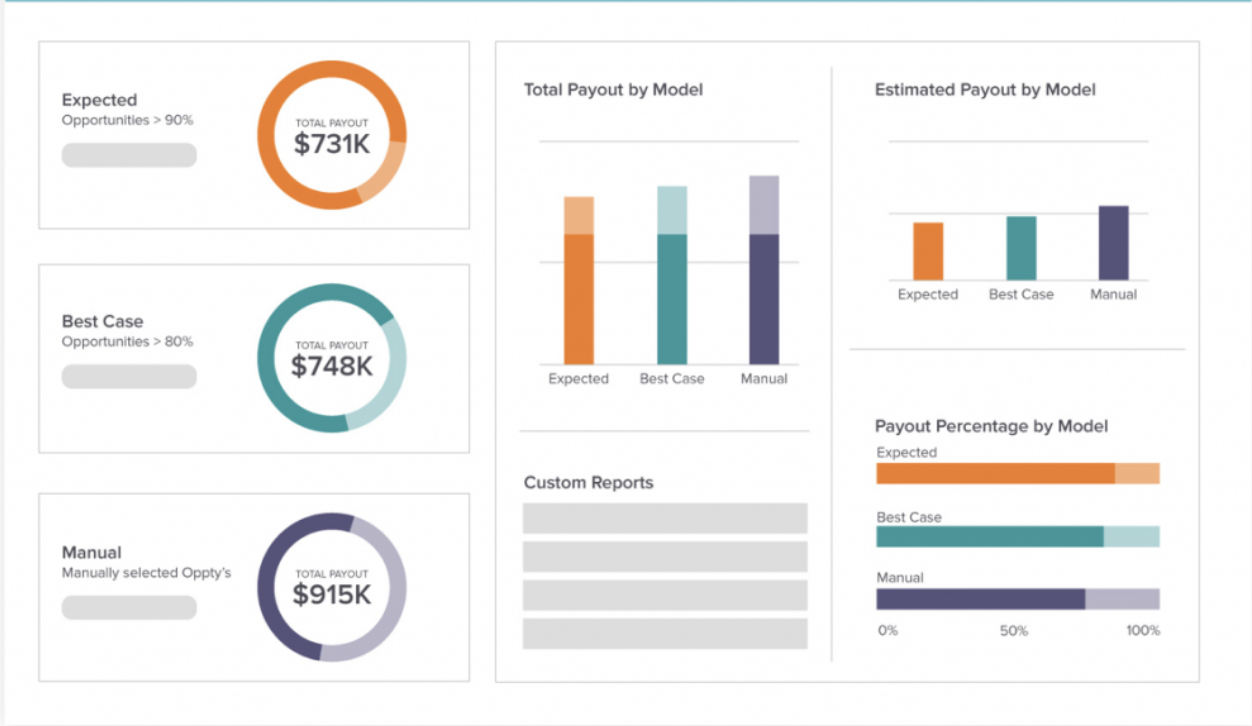
Image source: Xactly
- Price: Contact Xactly
- About: Xactly seeks to automate and simplify the incentive compensation process for sales teams. They pride their software on being over 99% accurate for forecasting and performance management data.
2. Anaplan
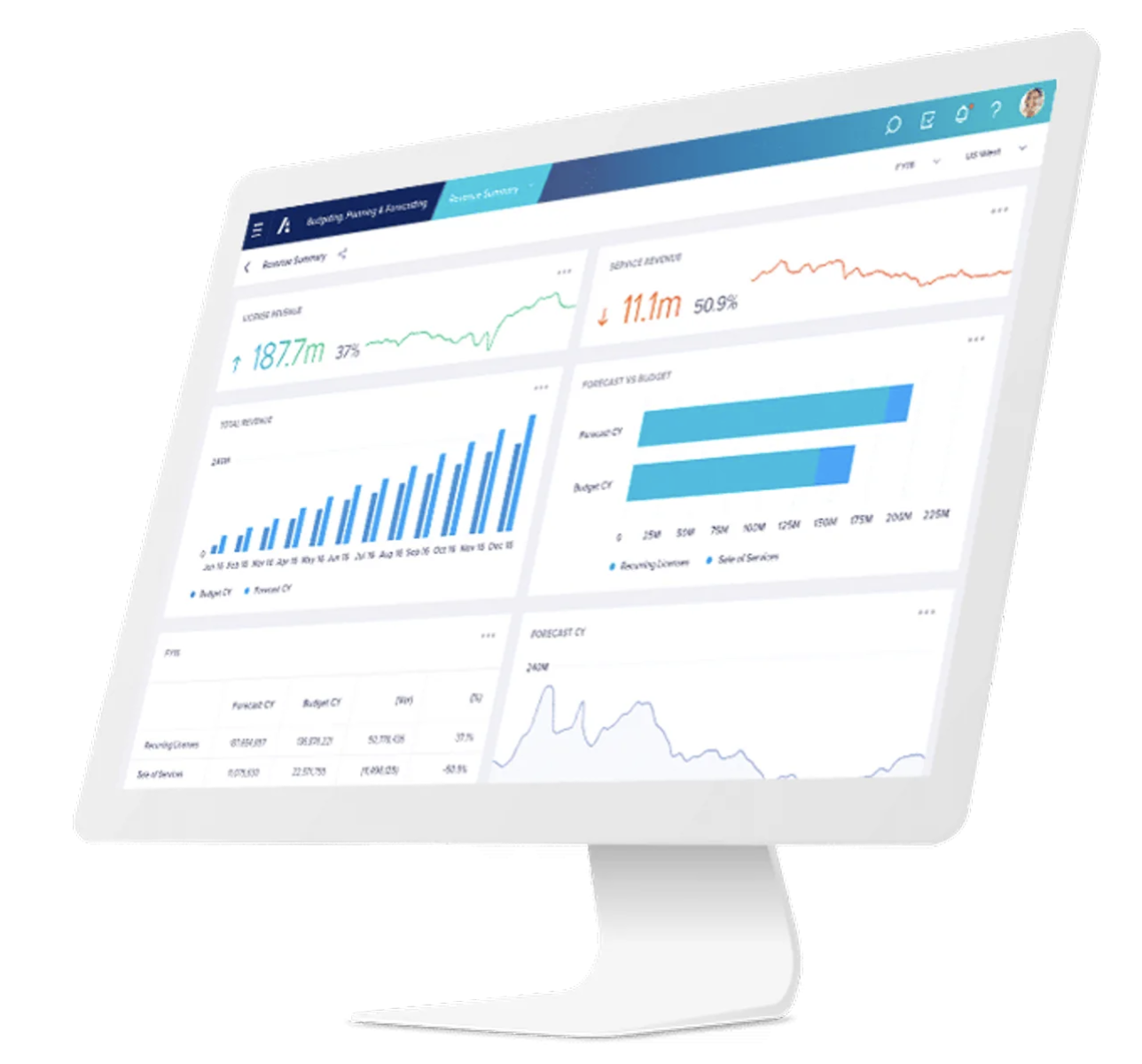
Image Source: Anaplan
- Price: Contact Anaplan
- About: Anaplan’s sales performance management software allows sales organizations to develop robust go-to-market strategies, using their team’s performance to drive planning.
3. IBM SPM Solutions

Image Source: IBM
- Price: Contact IBM
- About: IBM’s sales performance management software solution helps sales teams improve performance and operational efficiencies. Their areas of expertise include compensation planning and territory management.
4. SAP CallidusCloud Sales Performance Manager
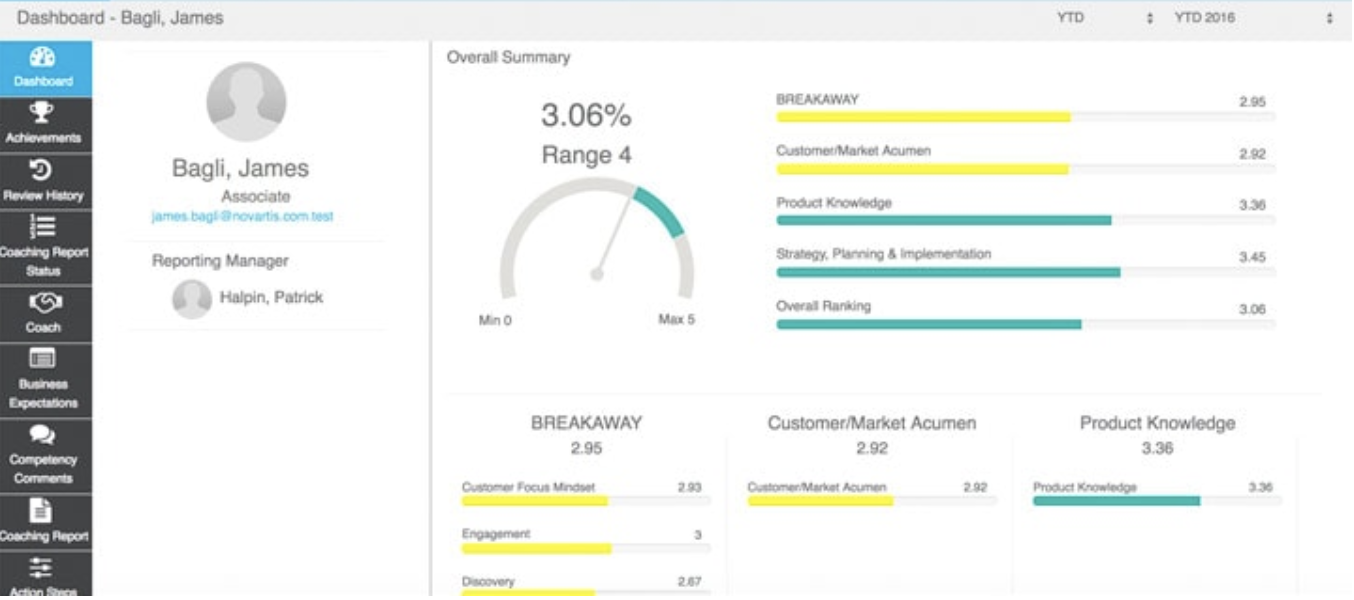
Image Source: SAP
- Price: Contact SAP
- About: SAP CallidusCloud focuses on helping sales organizations reach peak productivity. With tools to facilitate employee coaching, KPI tracking, and sales rep assessments, your sales reps will feel supported and included every step of the way.
5. Oracle Sales Performance Management
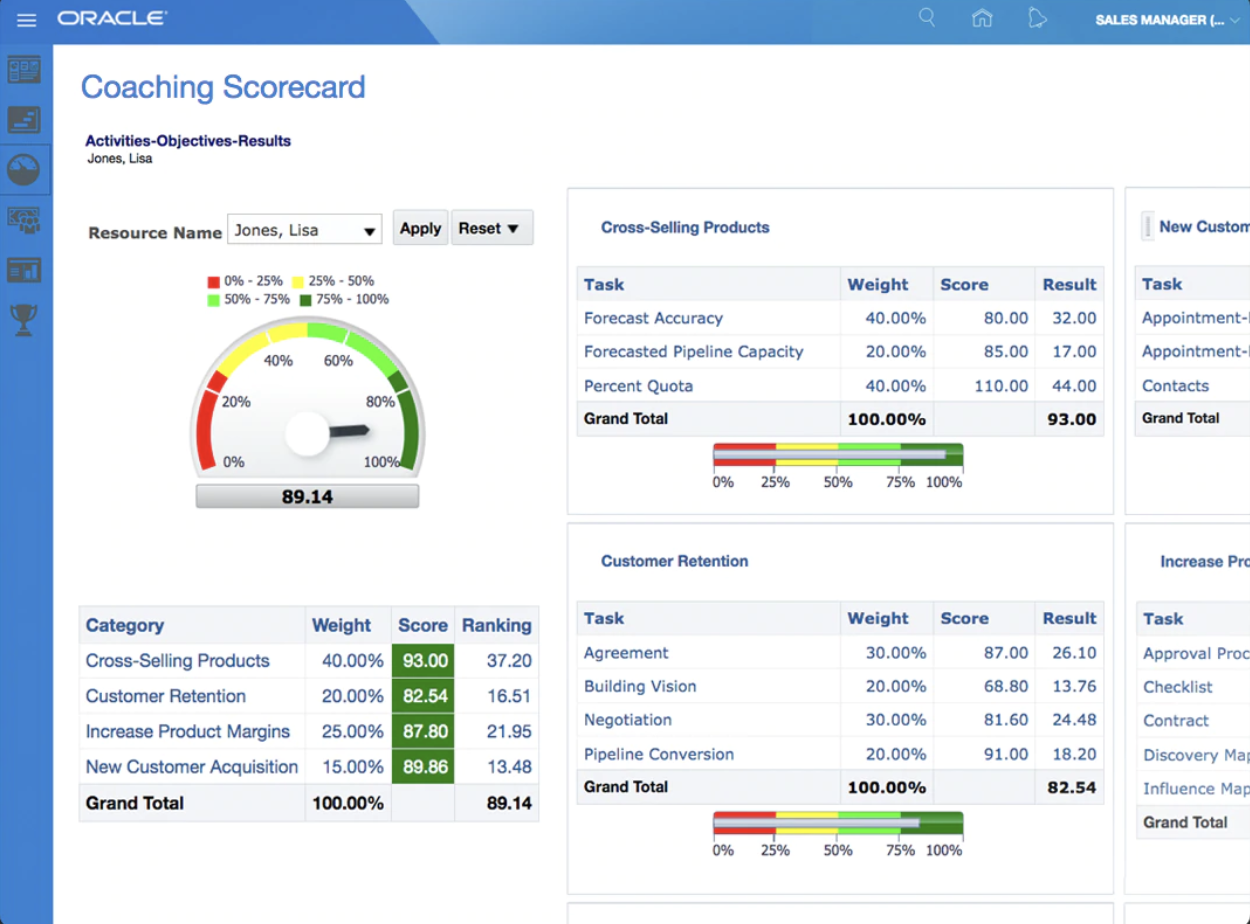
Image Source: Oracle
- Price: Contact Oracle
- About: Oracle’s Sales Performance Management application highlights sales rep accountability, guiding reps through skill-building task lists and training modules. The tool also features a white space analysis feature, so sales teams can focus on accounts with the highest revenue potential to achieve revenue goals.
6. Optymyze
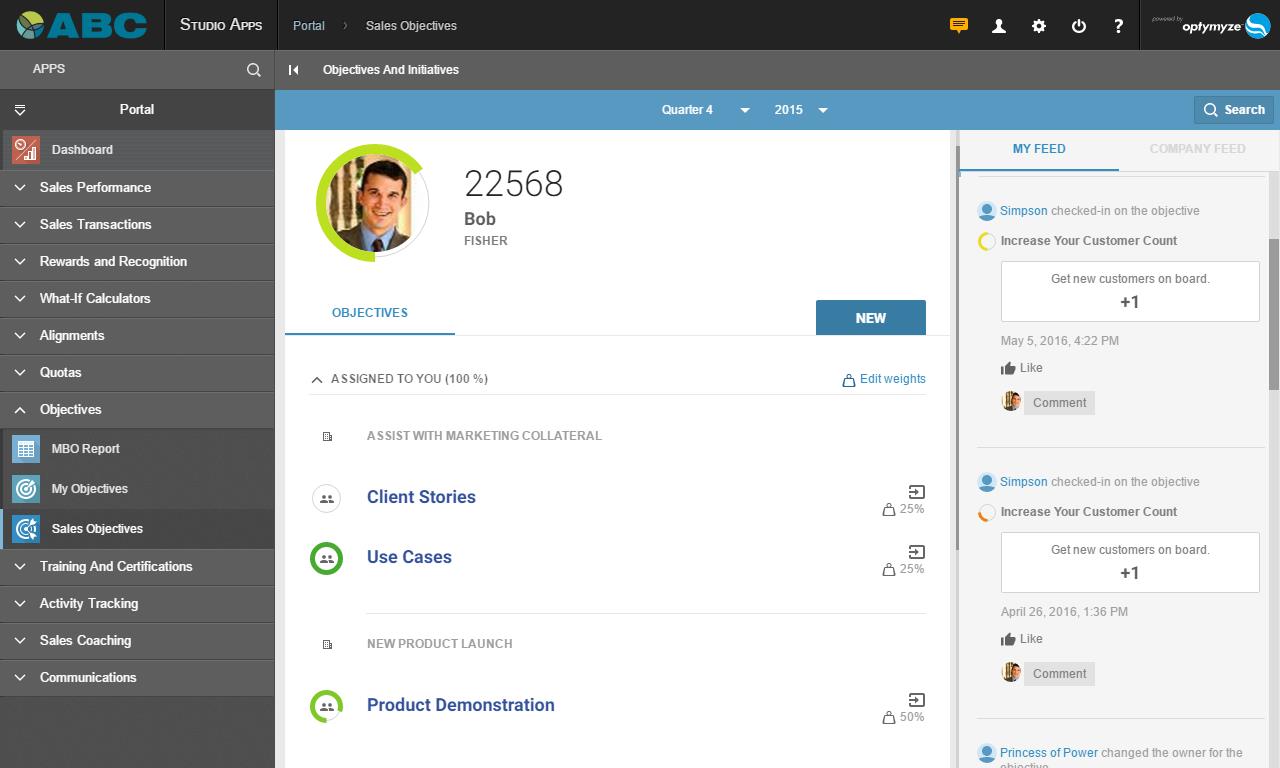
Image Source: Optymyze
- Price: Contact Optymyze
- About: Optymyze offers a suite of solutions to help sales leaders and reps drive performance. Their offerings include integrated compensation management, sales quota tools to keep reps engaged, and sales territory management software to maximize revenue potential.
Proper implementation of a sales management process can drive efficiency and overall effectiveness for your sales organization. Check out the five important sales metrics every rep and manager should be tracking to learn more about sales performance.
![]()
Source: hubspot sales
